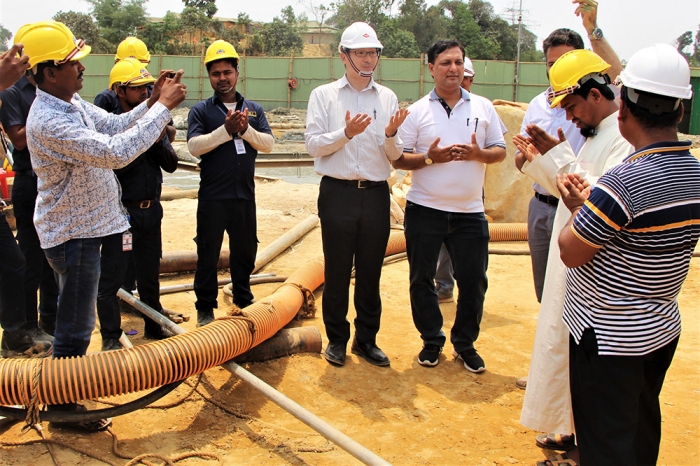News & Updates
IOM, Japan and Bangladesh are working together to bring clean water to Rohingya refugees
10 April 2018

The UN Migration Agency (IOM), the Japan International Cooperation Agency (JICA) and Bangladesh’s Department of Public Health Engineering (DPHE) are bringing easily accessible and safe water to 30,000 Rohingya refugees in Cox’s Bazar.
IOM, JICA and DPHE have collaborated on a major borehole project which opens this week.
It is the first part of a wider project that is designed to meet the increasingly water needs of the Ukhiya district of Bangladesh.
Since August 2017 the large influx of Rohingya refugees has placed a significant strain on the water supply in Cox’s Bazar, with both refugees and host communities suffering from insufficient and unclean water supplies.
Estimates suggest that there are over 1.3 million Rohingya refugees in Bangladesh.
The new well will help the DPHE establish the demand of the wider water production and supply system when it is operating at full capacity.
The targeted population is predicted to require 500 cubic metres of safe water each day.
Once the borehole work is complete next month, the IOM will construct the larger water supply network. The IOM predicts that water distribution will begin within three months of the borehole’s installation.
Naoki Matsumura, JICA’s country program coordinator for disaster management commented:
“The camp is very congested. Almost 95 per cent of toilets are close to water points, and these eventually degrade the water quality. So, the Government decided to go for establishing deep tube wells. We thought that there might be problem with deep tube wells as well in future. So, we decided to go deeper and establish this deep ground water production well”
“This boring machine can drill down to 400 meters, which is very useful if we need to dig deeper than the existing deep tube wells in the camps. A lot of water can be lifted through the thick pipe of the borehole, tested and treated to ensure the quality, before being distributed to a very large number of people”
Md. Saifur Rahman, DPHE’s Superintending Engineer, Groundwater Circle added:
“Access to safe water is a human right. This investigatory project poses several challenges. First is getting good quality ground water. This is just the initial step to see how successful the project will be”
In addition, as part of the water supply network 20 water points will be set up in the camp. These points will have 4-6 taps and serve 250 people per tap each day without queuing for longer than 30 minutes.
Households will not have to travel further than 500 metres to their nearest water point.
Manuel Pereira, IOM Cox’s Bazar Emergency Coordinator noted:
“It’s very difficult to ensure safe ground water here. But we’re very excited about this project, which is the first of its kind in the camp. It will ensure daily access to safe water for 30,000 – 40,000 people”
“If it’s a success, we will scale it up in other areas of the camp, as well as in host communities, especially in Teknaf where groundwater is scarce”
If you’d like to stay informed on the latest updates in aid and development, please sign up for the AIDF newsletter.
Image credit: Abdullah Al Mashrif / IOM